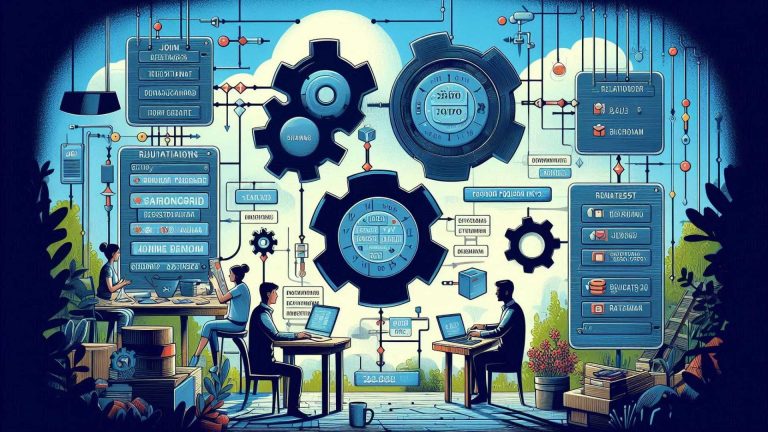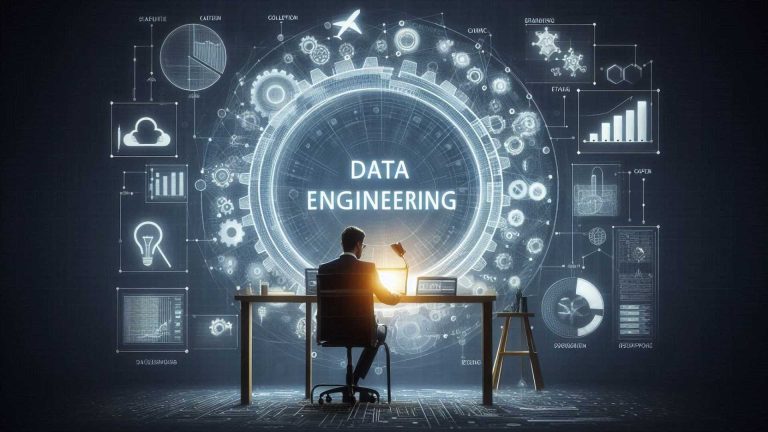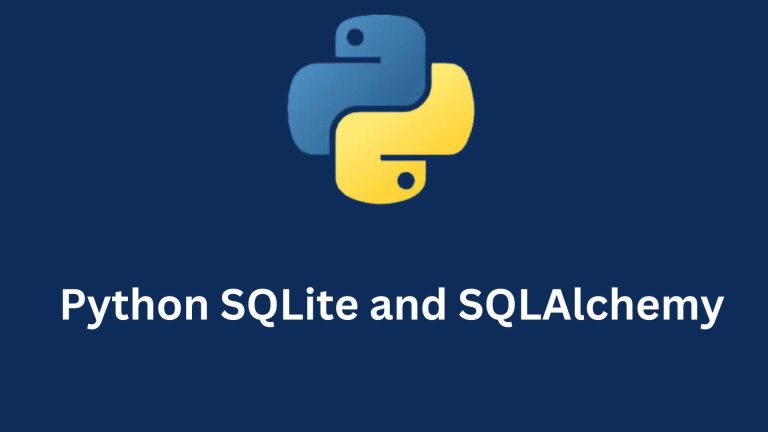Data science skills are essential competencies that individuals need to excel in the field of data science. These skills encompass a wide range of technical, analytical, and soft skills that are crucial for processing and analyzing large volumes of data to extract valuable insights. Let’s delve into the specifics of data science skills, their importance in today’s world, and their relevance for Indian students.
What are Data Science Skills?
Data science skills encompass a diverse set of abilities that enable professionals to effectively work with data. These skills include:
- Programming Skills: Proficiency in programming languages like Python, R, and Java is fundamental for data manipulation, analysis, and visualization.
- Statistical Skills: Understanding statistical concepts and methods is crucial for interpreting data and drawing meaningful conclusions.
- Machine Learning: Knowledge of machine learning algorithms and techniques is essential for building predictive models and making data-driven decisions.
- Data Visualization: Ability to create visual representations of data to communicate insights effectively.
- Big Data Technologies: Familiarity with tools like Hadoop, Spark, and SQL for managing and analyzing large datasets.
- Domain Knowledge: Understanding of the specific industry or domain to contextualize data analysis and derive actionable insights.
Importance of Data Science Skills in Today’s World
In the contemporary landscape, data science skills play a pivotal role in driving innovation, enhancing decision-making, and fostering growth across various industries. The significance of these skills can be highlighted in the following ways:
- Informed Decision-Making: Data science skills empower organizations to make informed decisions based on data-driven insights rather than intuition.
- Competitive Advantage: Companies leveraging data science skills gain a competitive edge by optimizing processes, identifying trends, and predicting future outcomes.
- Business Transformation: Data science skills facilitate business transformation by enabling organizations to adapt to changing market dynamics and consumer preferences.
- Personalization and Customer Experience: By analyzing customer data, businesses can personalize offerings, improve customer experience, and enhance customer satisfaction.
Relevance of Data Science Skills for Indian Students
For Indian students, acquiring data science skills is particularly beneficial for the following reasons:
- Career Opportunities: Data science skills open up a plethora of career opportunities in India’s rapidly growing tech and analytics industry.
- Global Demand: The global demand for data scientists presents Indian students with opportunities to work with leading international organizations.
- Skill Development: Developing data science skills equips Indian students with the expertise needed to address complex business challenges and contribute to data-driven decision-making.
- Industry Alignment: Data science skills align with the evolving needs of industries in India, including IT, finance, healthcare, and e-commerce, offering students diverse career paths.
Mastering data science skills is imperative in today’s data-driven world, offering individuals the ability to harness the power of data for innovation, problem-solving, and strategic decision-making. Indian students stand to benefit significantly from acquiring these skills, positioning themselves for success in a data-centric future.
Essential Data Science Skills for Beginners
As a beginner in the field of data science, it’s crucial to master a core set of skills that form the foundation for success. These skills include statistical analysis, programming languages, data visualization, machine learning basics, and database management. Let’s delve into each of these essential skills in detail.
Statistical Analysis
Statistical analysis is a fundamental skill for data scientists, as it enables them to interpret and draw meaningful conclusions from data. Key statistical concepts that beginners should master include:
- Probability distributions: Understanding different probability distributions, such as normal, binomial, and Poisson distributions, is essential for modeling and inference.
- Hypothesis testing: Ability to formulate hypotheses, select appropriate statistical tests, and interpret the results to conclude a population.
- Regression analysis: Proficiency in linear and logistic regression techniques for modeling the relationship between variables.
- Descriptive statistics: Calculating and interpreting measures of central tendency (mean, median, mode) and dispersion (variance, standard deviation) to summarize data.
Mastering these statistical concepts will provide a solid foundation for more advanced data analysis techniques.
Programming Languages: Python and R
Proficiency in at least one programming language is a must for data scientists. Python and R are two of the most popular and widely used languages in the field of data science.
Python:
- Python is a general-purpose programming language known for its simplicity, readability, and versatility.
- It offers a wide range of libraries and frameworks for data manipulation, analysis, and machine learning, such as NumPy, Pandas, and Scikit-learn.
- Python is also suitable for web development, automation, and scripting tasks.
R:
- R is a programming language and software environment specifically designed for statistical computing and graphics.
- It provides a vast collection of packages and libraries for data manipulation, visualization, and statistical modeling.
- R is particularly strong in exploratory data analysis, statistical inference, and developing custom statistical models.
As a beginner, it’s recommended to choose either Python or R and focus on mastering its syntax, data structures, and libraries for data science tasks. Both languages have extensive online resources, documentation, and communities to support learning and development.
Data Visualization
Data visualization is a crucial skill for effectively communicating insights derived from data. It involves creating visual representations of data, such as charts, graphs, and plots, to help stakeholders understand complex information more easily.
Key data visualization tools and libraries include:
- Matplotlib: A widely used library in Python for creating static, animated, and interactive visualizations.
- Seaborn: A data visualization library built on top of Matplotlib, providing a more polished interface for creating statistical graphics.
- Tableau: A popular data visualization software that allows users to create interactive dashboards and reports without extensive programming knowledge.
- Power BI: A business analytics service by Microsoft that provides interactive visualizations and business intelligence capabilities.
Mastering data visualization skills enables data scientists to present their findings in a clear, concise, and compelling manner, making it easier for stakeholders to understand and act upon the insights.
Machine Learning Basics
Machine learning is a core component of data science, allowing algorithms to learn from data and make predictions or decisions without being explicitly programmed. As a beginner, it’s essential to understand the fundamentals of machine learning, including:
- Supervised learning: Techniques such as linear regression, logistic regression, and decision trees for predicting outcomes based on labeled data.
- Unsupervised learning: Methods like k-means clustering and principal component analysis for discovering patterns and insights in unlabeled data.
- Model evaluation: Assessing the performance of machine learning models using metrics such as accuracy, precision, recall, and F1-score.
- Feature engineering: The process of selecting, manipulating, and transforming raw data features to improve the performance of machine learning models.
Popular machine-learning libraries and frameworks include Scikit-learn (Python), TensorFlow (Python), and XGBoost (Python and R). Mastering these basics will provide a solid foundation for exploring more advanced machine-learning techniques.
Database Management
Data scientists often work with large volumes of data stored in various formats and locations. Understanding database management concepts is crucial for efficiently storing, retrieving, and manipulating data. Key skills include:
- SQL: Structured Query Language is a programming language used for managing and manipulating relational databases. Proficiency in SQL is essential for querying, filtering, and aggregating data.
- Database systems: Knowledge of different database systems, such as MySQL, PostgreSQL, and SQLite, and their specific features and use cases.
- NoSQL databases: Understanding of non-relational databases, such as MongoDB and Cassandra, which are designed to handle unstructured data and large-scale applications.
- Data warehousing: Familiarity with data warehousing concepts and tools, such as ETL (Extract, Transform, Load) processes and OLAP (Online Analytical Processing) cubes, for analyzing large datasets.
Mastering database management skills enables data scientists to efficiently store, manage, and access data, which is crucial for conducting data analysis and building machine learning models.
As a beginner in data science, focusing on these essential skills – statistical analysis, programming languages, data visualization, machine learning basics, and database management – will provide a solid foundation for success in the field. By continuously learning, practicing, and applying these skills, aspiring data scientists can develop a strong skill set and contribute to data-driven decision-making in various industries.
Advanced-Data Science Skills
As data science continues to evolve, professionals must stay up-to-date with the latest techniques and technologies to remain competitive. In this section, we’ll delve into five advanced data science skills: deep learning, natural language processing, big data. We’ll also cover cloud computing and time series analysis, which are becoming increasingly important.
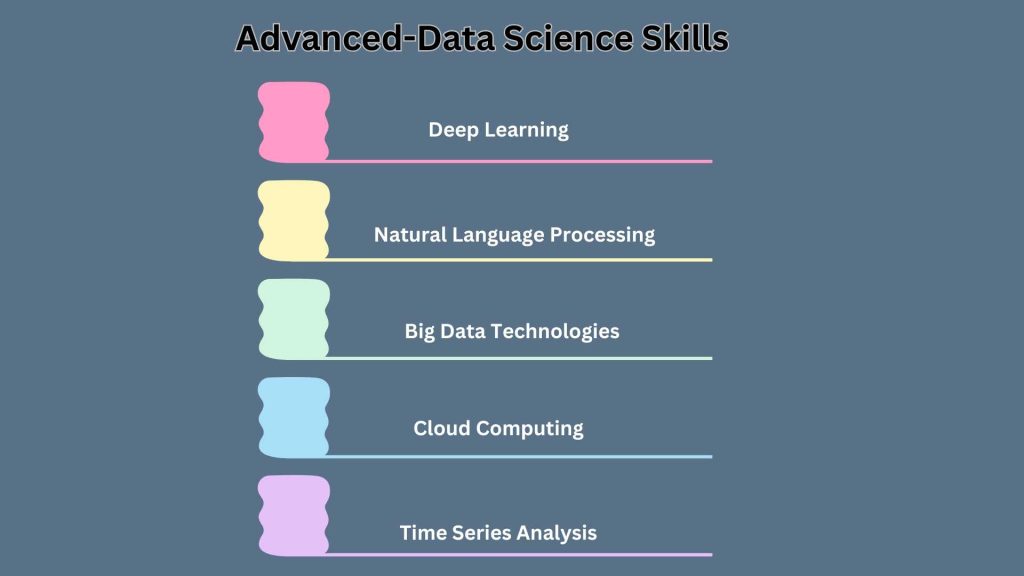
Deep Learning
Deep learning is a subset of machine learning that involves training artificial neural networks to learn from large amounts of data. It has revolutionized fields such as computer vision, speech recognition, and natural language processing. Key skills in deep learning include:
- Understanding neural network architectures: Familiarity with different types of neural networks, such as convolutional neural networks (CNNs) and recurrent neural networks (RNNs), and their applications.
- Proficiency in deep learning frameworks: Ability to use frameworks like TensorFlow, PyTorch, and Keras to build and train deep learning models.
- Hyperparameter tuning: Skill in optimizing hyperparameters, such as learning rate and batch size, to improve model performance.
- Transfer learning: Leveraging pre-trained models to solve new problems with limited data.
Mastering deep learning skills enables data scientists to tackle complex problems that require learning from large, unstructured datasets.
Natural Language Processing (NLP)
Natural language processing is a field that focuses on enabling computers to understand, interpret, and manipulate human language. It has applications in areas such as sentiment analysis, text classification, and machine translation. Key skills in NLP include:
- Text preprocessing: Ability to clean and preprocess text data, including tokenization, stemming, and lemmatization.
- Feature engineering: Skill in creating meaningful features from text data, such as bag-of-words and word embeddings.
- NLP algorithms: Understanding of algorithms like sentiment analysis, named entity recognition, and topic modeling.
- NLP libraries: Proficiency in using libraries like NLTK, spaCy, and Gensim for NLP tasks.
Mastering NLP skills allows data scientists to extract valuable insights from unstructured text data and build applications that interact with humans more naturally.
Big Data Technologies
As the volume, velocity, and variety of data continue to grow, traditional data processing techniques are becoming increasingly inadequate. Big data technologies provide scalable solutions for storing, processing, and analyzing large datasets. Key skills in big data technologies include:
- Hadoop ecosystem: Understanding of the Hadoop ecosystem, including HDFS, MapReduce, and Spark, for distributed data processing.
- NoSQL databases: Familiarity with NoSQL databases like MongoDB and Cassandra for storing and querying unstructured data.
- Streaming data processing: Ability to work with streaming data using tools like Apache Kafka and Apache Flink.
- Cloud platforms: Knowledge of cloud platforms like AWS, Google Cloud, and Microsoft Azure for scalable data storage and processing.
Mastering big data skills enables data scientists to work with large, complex datasets and build scalable, real-time data pipelines.
Cloud Computing
Cloud computing has become an essential tool for data scientists, providing scalable and cost-effective solutions for data storage, processing, and analysis. Key skills in cloud computing include:
- Cloud platforms: Familiarity with major cloud platforms like AWS, Google Cloud, and Microsoft Azure, and their data-related services.
- Cloud storage: Ability to work with cloud storage solutions like Amazon S3, Google Cloud Storage, and Azure Blob Storage.
- Cloud databases: Knowledge of cloud databases like Amazon RDS, Google Cloud SQL, and Azure SQL Database.
- Cloud computing: Understanding of cloud computing concepts like virtual machines, containers, and serverless computing.
Mastering cloud computing skills enables data scientists to quickly provision resources, scale up or down as needed, and collaborate with team members across different locations14.
Time Series Analysis
Time series analysis is the study of data points collected over time. It has applications in areas such as forecasting, anomaly detection, and trend analysis. Key skills in time series analysis include:
- Time series models: Understanding of time series models like autoregressive (AR), moving average (MA), and autoregressive integrated moving average (ARIMA).
- Forecasting techniques: Ability to use forecasting techniques like exponential smoothing and Holt-Winters to make predictions based on historical data.
- Anomaly detection: Skill in detecting anomalies and outliers in time series data using techniques like control charts and Shewhart charts.
- Time series libraries: Proficiency in using libraries like stats models, Prophet, and Darts for time series analysis and forecasting.
Mastering time series analysis skills enables data scientists to analyze and predict trends in data. That evolves, such as stock prices, website traffic, and sensor readings.
As data science continues to advance, mastering these five skills – deep learning, natural language processing, big data technologies, cloud computing, and time series analysis – will give data scientists a competitive edge in the job market and enable them to tackle increasingly complex problems. By continuously learning and practicing these skills, aspiring data scientists can position themselves for success in the rapidly evolving field of data science.
Industry Applications of Data Science Skills
Data science skills have far-reaching applications across various industries, transforming the way businesses operate and make decisions. In this section, we’ll explore the applications of data science in finance, healthcare, e-commerce, marketing, and social media.
Data Science in Finance
Data science is crucial in finance, aiding risk management, trading improvement, and customer experience enhancement. Key applications include:
- Risk Management: Data science helps in identifying and mitigating potential risks by analyzing large datasets and detecting patterns.
- Predictive Modeling: Data scientists use machine learning algorithms to forecast stock prices, predict customer behavior, and optimize investment portfolios.
- Fraud Detection: Machine learning algorithms are used to detect fraudulent transactions, reducing financial losses and enhancing security.
- Customer Segmentation: Data science enables financial institutions to segment customers based on their behavior, preferences, and demographics, allowing for targeted marketing and personalized services.
Data Science in Healthcare
Data science has revolutionized the healthcare industry, improving patient outcomes, streamlining operations, and reducing costs. Key applications include:
- Predictive Analytics: Data scientists use machine learning algorithms to predict patient outcomes, diagnose diseases, and identify high-risk patients.
- Medical Imaging: Data science is used in medical imaging to analyze images, detect anomalies, and aid in diagnosis.
- Personalized Medicine: Data science enables personalized treatment plans based on individual patient data, leading to more effective treatments and better patient outcomes.
- Disease Surveillance: Data science is used to track disease outbreaks, identify patterns, and predict future outbreaks, enabling proactive measures to be taken3.
Data Science in E-commerce
Data science is crucial in e-commerce, enabling businesses to personalize customer experiences, optimize operations, and increase revenue. Key applications include:
- Recommendation Systems: Data science is used to develop recommendation systems that suggest products based on customer behavior and preferences.
- Demand Forecasting: Data scientists use machine learning algorithms to forecast demand, enabling businesses to optimize inventory and supply chain management.
- Customer Segmentation: Data science enables e-commerce businesses to segment customers based on their behavior, preferences, and demographics, allowing for targeted marketing and personalized services.
- Price Optimization: Data science is used to optimize prices based on demand, competition, and customer behavior, leading to increased revenue and profitability.
Data Science in Marketing
Data science is transforming the marketing industry, enabling businesses to target customers more effectively, measure campaign performance, and optimize marketing strategies. Key applications include:
- Customer Segmentation: Data science enables marketers to segment customers based on their behavior, preferences, and demographics, allowing for targeted marketing and personalized services.
- Predictive Analytics: Data scientists use machine learning algorithms to predict customer behavior, enabling businesses to develop targeted marketing campaigns.
- Sentiment Analysis: Data science is used to analyze customer sentiment, enabling businesses to identify areas for improvement and develop more effective marketing strategies.
- Marketing Automation: Data science is used to automate marketing processes, enabling businesses to personalize customer experiences and optimize marketing campaigns.
Data Science in Social Media
Data science is crucial in social media, enabling businesses to analyze customer behavior, optimize content, and measure campaign performance. Key applications include:
- Sentiment Analysis: Data science is used to analyze customer sentiment on social media, enabling businesses to identify areas for improvement and develop more effective marketing strategies.
- Influencer Identification: Data science is used to identify influencers who can help promote products or services, enabling businesses to develop more effective marketing campaigns.
- Content Optimization: Data science is used to optimize content based on customer engagement, enabling businesses to develop more effective content strategies.
- Social Media Monitoring: Data science is used to monitor social media activity, enabling businesses to respond quickly to customer concerns and develop more effective customer service strategies.
Data science skills have numerous applications across various industries, enabling businesses to make data-driven decisions, optimize operations, and improve customer experiences. By leveraging data science skills, businesses can gain a competitive edge, drive innovation, and achieve success in their respective industries.
Developing Data Science Skills in India
India is witnessing a surge in demand for data science professionals, making it an opportune time for individuals to develop and enhance their data science skills. In this section, we will explore the best courses and certifications, online learning platforms, data science communities and events, internship opportunities, and career paths in data science in India.
Best Courses and Certifications
To excel in the field of data science in India, individuals can benefit from enrolling in specialized courses and certifications that provide in-depth knowledge and hands-on experience. Some of the best courses and certifications include:
- Foundations of Data Science: A course focusing on communication, data analysis, planning, and project management skills.
- Google Advanced Data Analytics: A professional certificate program covering communication, computer programming, data analysis, data visualization, machine learning, and more.
- Advanced Data Science with IBM: A specialization program offering training in machine learning, Python programming, statistical programming, data management, and deep learning.
- Advanced Statistics for Data Science: A specialization program focusing on general statistics, probability & statistics, regression, statistical analysis, and more.
- Data Warehousing for Business Intelligence: A specialization program covering data warehousing, databases, business intelligence, data analysis, data visualization, and leadership skills.
By completing these courses and certifications, individuals can acquire a diverse set of data science skills that are highly sought after in the Indian job market.
Data Science Communities and Events
Engaging with data science communities offers valuable networking opportunities. Attending industry events provides insights into trends. Some prominent data science communities and events in India include:
- Analytics Insight: A platform offering insights into the recruitment landscape for big data analysts and data scientists in India.
- DataMites Official Blog: Provides information on essential skills required for data scientists, including technical and non-technical skills.
- Data Science Meetups: Regular meetups and events where data science professionals gather to share knowledge, discuss trends, and network with like-minded individuals.
By actively participating in these communities and events, individuals can stay updated on industry developments, connect with peers, and expand their professional network in the data science domain.
Internship Opportunities
Internship opportunities play a crucial role in gaining practical experience and applying data science skills in real-world scenarios. In India, aspiring data scientists can explore internship opportunities in various industries, including finance, healthcare, e-commerce, marketing, and social media. These internships offer hands-on experience, exposure to industry practices, and the chance to work on projects.
Career Paths in Data Science
Data science offers diverse career paths for individuals with varying levels of expertise and interests. Some common career paths in data science in India include:
- Data Analyst: Entry-level role focusing on analyzing data, generating insights, and creating reports.
- Data Scientist: Mid-level role involving advanced data analysis, machine learning, and predictive modeling.
- Data Engineer: Role focusing on designing and building data pipelines, databases, and infrastructure for data processing.
- Business Intelligence Analyst: The role involves analyzing business data, creating dashboards, and providing insights to support decision-making.
- Machine Learning Engineer: Role focusing on developing and deploying machine learning models for various applications.
By understanding these career paths and acquiring the necessary data science skills, individuals in India can chart a successful career trajectory in the dynamic and rapidly growing field of data science.
Developing data science skills in India involves a combination of formal education, online learning, community engagement, practical experience, and career planning. By leveraging the resources and opportunities available, individuals can enhance their data science skills, stay competitive in the job market, and pursue rewarding career paths in the data-driven industry landscape of India.
Tips for Mastering Data Science Skills
Mastering data science skills requires dedication, practice, and a continuous commitment to learning and growth. In this section, we’ll cover essential tips for excelling in data science: regular practice, real-world projects, and competitions. Joining data science communities and emphasizing continuous learning and skill development are crucial.
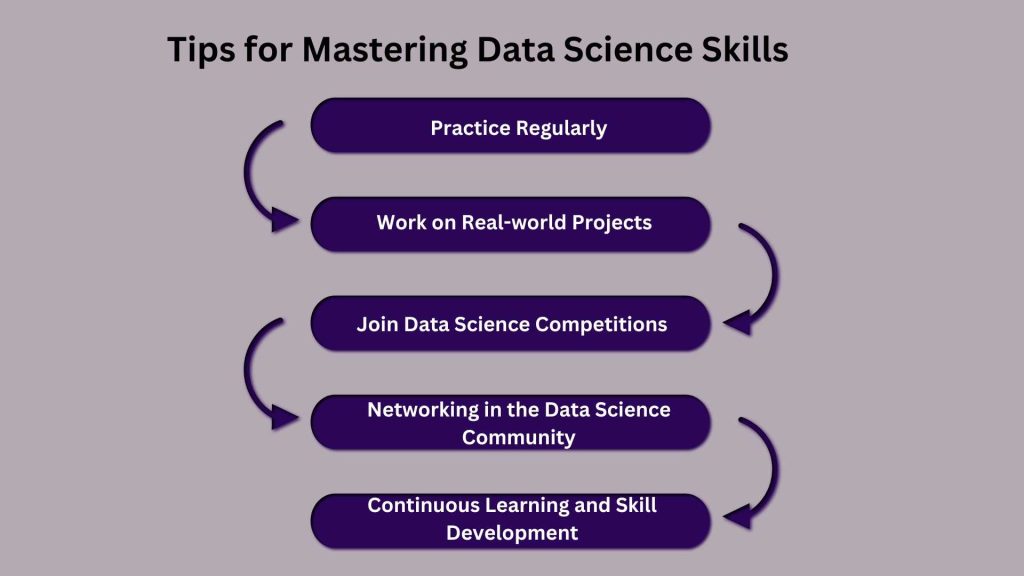
Practice Regularly
Regular practice is key to mastering data science skills and staying sharp in a rapidly evolving field. By dedicating time each day to practice coding, analyze data, and work on data science projects, individuals can enhance their proficiency and build confidence in their abilities. Some practical tips for regular practice include:
- Coding Challenges: Engage in coding challenges on platforms like LeetCode and HackerRank to sharpen your programming skills.
- Data Analysis Exercises: Work on data analysis exercises using tools like Python, R, and SQL to manipulate and visualize data effectively.
- Algorithm Implementation: Implement machine learning algorithms from scratch to deepen your understanding of how they work.
- Experimentation: Explore new datasets, experiment with different techniques, and push the boundaries of your knowledge to expand your skill set.
By incorporating the regular practice into your routine, you can reinforce your data science skills, identify areas for improvement, and stay ahead of the curve in the competitive data science landscape.
Work on Real-world Projects
Working on real-world projects is a valuable way to apply theoretical knowledge, gain practical experience, and showcase your skills to potential employers. Real-world projects allow you to tackle complex problems, work with diverse datasets, and demonstrate your ability to deliver actionable insights. Some tips for working on real-world projects include:
- Identify a Problem: Choose a data science problem that interests you and aligns with your career goals.
- Data Collection: Gather relevant data from various sources, ensuring it is clean, structured, and suitable for analysis.
- Analysis and Modeling: Apply data science techniques to analyze the data, build predictive models, and derive insights.
- Visualization and Communication: Present your findings using data visualization techniques to effectively communicate insights to stakeholders.
- Iterative Approach: Embrace an iterative approach to project development, seeking feedback, and continuously improving your solutions.
Real-world projects not only enhance your technical skills but also demonstrate your problem-solving abilities and creativity to potential employers.
Join Data Science Competitions
Participating in data science competitions provides a platform to test your skills, collaborate with peers, and solve real-world challenges. Competitions like those on Kaggle offer a diverse range of datasets and problems that allow you to apply your data science skills in a competitive environment. Some benefits of joining data science competitions include:
- Hands-on Experience: Gain practical experience by working on diverse datasets and solving complex problems.
- Networking Opportunities: Connect with data science professionals, share knowledge, and learn from others in the community.
- Skill Enhancement: Improve your problem-solving skills, algorithmic thinking, and data analysis techniques through competition challenges.
- Recognition: Showcase your skills, build a portfolio of successful projects, and gain recognition within the data science community.
By participating in data science competitions, you can push your boundaries, learn new techniques, and enhance your problem-solving skills in a collaborative and competitive setting.
Networking in the Data Science Community
Networking plays a crucial role in the professional development of data scientists, providing opportunities to connect with industry experts, share knowledge, and stay updated on the latest trends. Engaging with the data science community through events, meetups, forums, and online platforms can offer valuable insights and foster meaningful connections. Some ways to network in the data science community include:
- Attend Meetups and Conferences: Participate in data science meetups, conferences, and webinars to connect with like-minded professionals and industry leaders.
- Join Online Forums: Engage in data science forums, such as Reddit’s r/datascience or LinkedIn groups, to share ideas, ask questions, and learn from others.
- Collaborate on Projects: Collaborate with peers on data science projects, hackathons, or research initiatives to build relationships and expand your network.
- Contribute to Open Source: Contribute to open-source data science projects, share your code, and collaborate with developers to enhance your skills and visibility in the community.
Networking in the data science community not only provides opportunities for learning and growth but also opens doors to potential collaborations, mentorships, and career advancements.
Continuous Learning and Skill Development
Continuous learning maintains data scientists’ relevance, aids in adapting to new technologies, and fosters career advancement. Prioritizing continuous learning and skill development enables individuals to expand their knowledge and explore new domains. It ensures they remain at the forefront of data science innovation. Some strategies for continuous learning and skill development include:
- Online Courses and Certifications: Enroll in online courses, certifications, and specializations to acquire new skills, deepen your expertise, and stay updated on industry trends.
- Read Research Papers and Journals: Stay informed about the latest research, methodologies, and best practices in data science by reading research papers, journals, and publications.
- Hands-on Projects: Work on personal projects, research initiatives, or open-source contributions to apply new concepts, experiment with techniques, and enhance your portfolio.
- Mentorship and Coaching: Seek mentorship from experienced data scientists, participate in coaching programs, and learn from industry experts to gain valuable insights and guidance.
- Professional Development: Attend workshops, webinars, and seminars to develop soft skills, leadership abilities, and business acumen that complement your technical expertise.
Embracing continuous learning and skill development enables data scientists to adapt, explore, and advance their careers. It fosters adaptability to changing demands and opens doors to new opportunities. Mastering data science skills demands regular practice, real-world experience, competition participation, networking, and continuous learning. Following these tips, individuals enhance skills, build knowledge, and thrive in data science’s competitive landscape.
Conclusion
In conclusion, mastering data science skills is crucial for individuals looking to thrive in the rapidly evolving world of data-driven decision-making. Key skills include statistical analysis, programming languages, data visualization, machine learning, and database management. As the field continues to advance, continuous learning and skill development are essential for staying relevant and competitive. Enrolling in a comprehensive data science course equips aspiring professionals with the necessary knowledge and experience. It provides the support needed to launch successful careers in this dynamic field.
Frequently Asked Questions
1) What are the essential data science skills needed to succeed in the field?
Proficiency in programming languages like Python, R, and SQL; strong mathematical and statistical knowledge; and data visualization skills to effectively communicate insights. Additionally, skills in big data processing, machine learning, and AI are crucial.
2) How can beginners develop foundational data science skills?
Beginners can start by learning programming fundamentals, statistics, and linear algebra. Hands-on projects, online courses, and engaging with the data science community can help develop these foundational skills.
3) What are the most in-demand technical skills for data scientists?
The most in-demand technical skills include expertise in data wrangling, machine learning, deep learning, natural language processing, and big data technologies like Hadoop and Spark. Familiarity with cloud computing platforms is also valuable.
4) How important are communication and soft skills for data science professionals?
Communication and soft skills are highly important for data scientists. They need to effectively present insights, collaborate with cross-functional teams, and translate technical concepts for non-technical stakeholders.
5) What are some effective ways to continuously improve data science skills?
Continuously improving data science skills involves staying updated on industry trends, taking online courses and certifications, participating in data science communities, and working on personal projects to apply new techniques.

